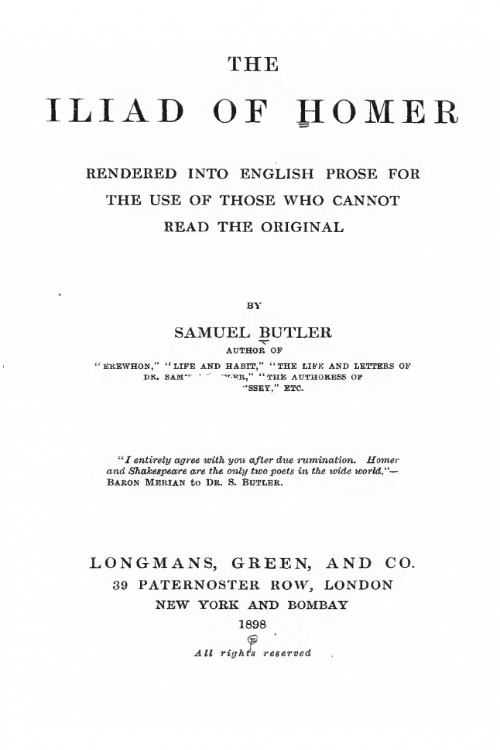Text summary
From: Book · Samuel Butler · 1898

Text: Full Translation, Collation (partial)
Ancient Greek ⟶ English a b
Record notes
About these data
| Data provider | Perseus Scaife Viewer |
| Record no. | urn:cts:greekLit:tlg0012.tlg001.perseus-eng4 Iliad, The Iliad of Homer rendered into English prose for the use of those who cannot read the original |
| Retrieval date | Jul. 19, 2020 |
| Copyright | Perseus Digital Library @ Tufts |
Background
The Iliad of Homer (Samuel Butler translation) is a well-known and freely available translation of the Homeric epic known as The Iliad. It was published in 1898 by Samuel Butler and was intended for a broader audience. It is written in prose form, meaning that it is meant to be read in paragraph block form like most people read today. Because it is past its copyright limit, it has been widely distributed and modified.
Cite this page
OMNIKA Foundation Contributors. ""The Iliad": English Translation by Samuel Butler." OMNIKA – World Mythology Index, OMNIKA Foundation, 10 Jul. 2020, omnika.org/stable/875. Accessed 14 Feb. 2026.
OMNIKA (2020, July 10). "The Iliad": English Translation by Samuel Butler. Retrieved from https://omnika.org/stable/875
OMNIKA Foundation Contributors. ""The Iliad": English Translation by Samuel Butler." Las Vegas, NV: OMNIKA Foundation. Created July 10, 2020. Accessed February 14, 2026. https://omnika.org/stable/875.





